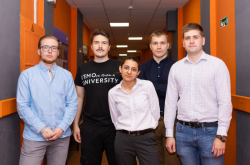On studies at ITMO
How did you come to ITMO?
When I went to school, I was in a class with a focus on IT and one of our teachers and one of our teachers was from ITMO, so he would often bring in students who told us about the university or held interesting contests.
Everyone liked those lessons, so the majority of my classmates aimed to enroll at ITMO. We all took part in a contest to get in – some succeeded, some didn’t, but many of us came to ITMO.
I was among those who got in not thanks to the contest but based on my USE scores. Initially, I wanted to study at the Faculty of Secure Information Technologies, but my score wasn’t enough for it, so I ended up at the Department of Infocommunication Technologies.
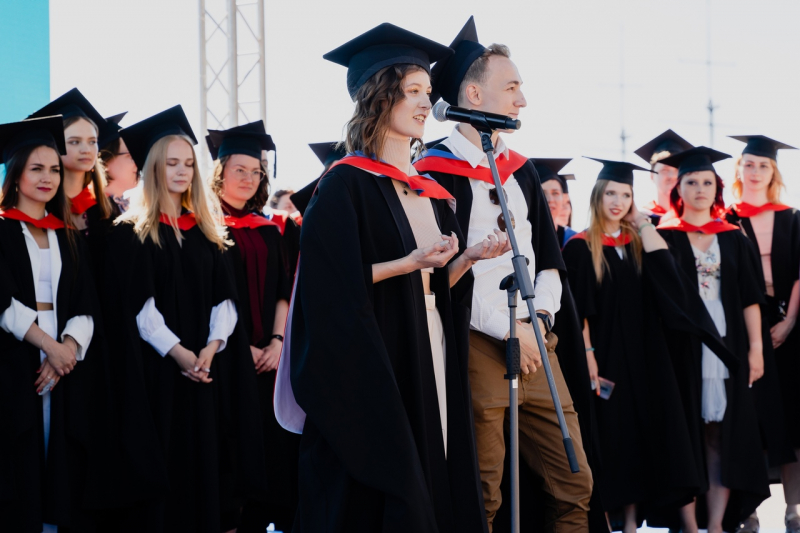
Ekaterina Smelaya at ITMO's graduation event
Did your experience at ITMO match the stories of those students?
We heard a lot about the way the university interacts with its students – and all we heard was true. First of all, we were told about trust, meaning that no one keeps tabs on your attendance. It is your choice, because you are the one that came here to learn. The university comes up with a great program and then trusts its students with their choices.
I also learned that there is much more than just studies at ITMO – you can apply for any grant, any internship there is, and the university will have your back. Our lecturers would always share info about such opportunities, and my friends from other universities tell me it doesn’t happen on the same scale everywhere.
What are your impressions of studying at ITMO?
To be honest, the way our studies were organized came as a bit of a letdown during my Bachelor’s – I take it I was an idealist back in the day. For instance, some of our lab classes were taken from the 2013 curricula, which is not ideal for programmers. However, I did come to appreciate the knowledge we received when I landed a job in my chosen field. And then I picked Science Communication for my Master’s, but that was more for myself than for work.
Work and studies at ITMO
How and when did you land that job that you mentioned? Were you still a student then?
I was. I found it by pure chance in the fourth year of my Bachelor’s studies. ITMO had a booth at an IT festival where I came to hang out with my friends. While I was waiting for them, I circled the venue, leaving my contact details with company representatives. I also won some mugs and some cool merch.
After a while, I got a call inviting me to work at one of the companies – at a computer vision department, even though my studies had nothing to do with machine learning.
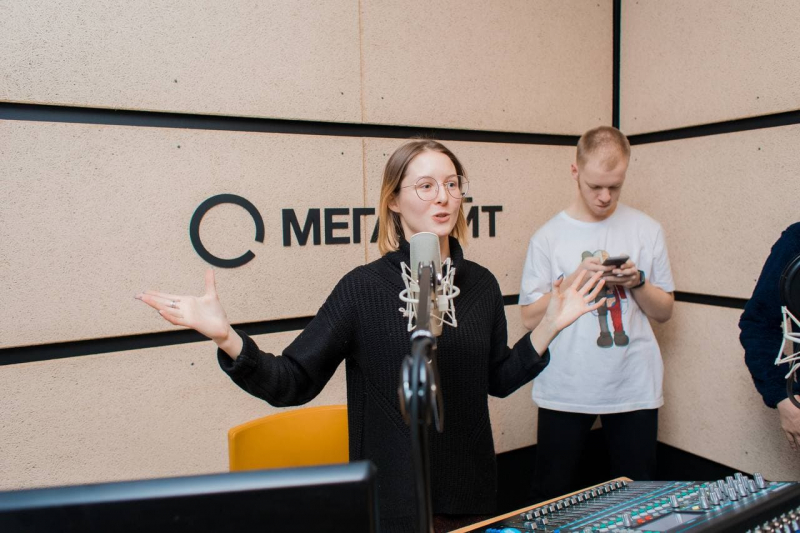
Ekaterina Smelaya at Megabyte radio
And then your classes came in really handy…
Yes, the math that we learned proved to be really useful. Many of my groupmates tended to overlook it, even though our lecturers were superb. The knowledge that I had deemed redundant during my studies actually helped me out a lot.
I can say the same about Windows and Linux system administration classics, as well as the fundamentals of programming.
Was it difficult to combine your studies with work?
It got easy by my fourth year because we didn’t have as many classes as in the first three. And, generally, everything at the university is made to accommodate students working in their fields, so, for instance, you can always arrange to take a test with another group and so on.
Are you still employed at the same company?
No, I am now a systems analyst at Digital Economy League, where I also get to apply the skills I received in my Bachelor’s. Though my Master’s studies also get to shine. We had a course in communication, and as an analyst I do have to connect to a lot of people. As I see it, my success depends on whether or not I can find the right approach to anyone, so I really benefit from the course here, too.
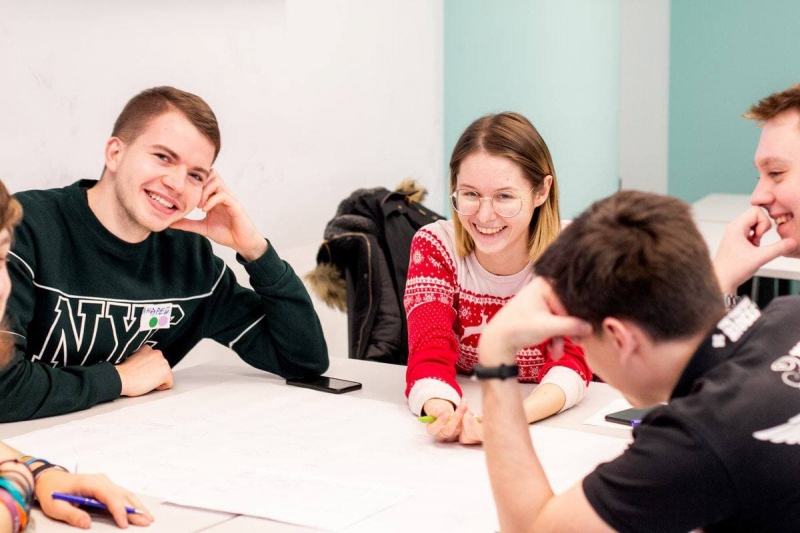
Ekaterina Smelaya at soft skills classes
Not only studies
Do you have any hobbies?
I have a hobby that became my job and then a hobby again. ITMO has the Megabyte student media and I used to manage its radio department for quite a while: we recorded podcasts and ran interesting projects.
I liked hosting the podcast: you stay invisible but everyone can hear you. It was my job for a while until I left to pursue a career in IT, but I still keep in touch with the Megabyte team and take part in their projects, because I really enjoy it.
So, you’ve found your hobby during your studies – how easy is it to discover your passion at ITMO?
There are actually a lot of opportunities: ITMO has a great system of student clubs and activities. I have recently been shocked to discover a knitting club. There is a club for everything, even for something you never knew existed – such as Hawaiian dance!
At the same time, most clubs don’t really have any entrance requirements and are open for anyone; only a rare few audition their newcomers.
Are you planning to keep making podcasts?
I actually have two podcasts that I’m running. The first one, Что и требовалось доказать (Which was to be proved – Ed.), is a collaboration with the Ne Naprasno foundation; it provides info about cancer. In the second one, Что под скорлупой? (What’s under the shell? – Ed.), we talk about the brain – for instance, there are episodes on why we fall in love or why we experience déjà vu.
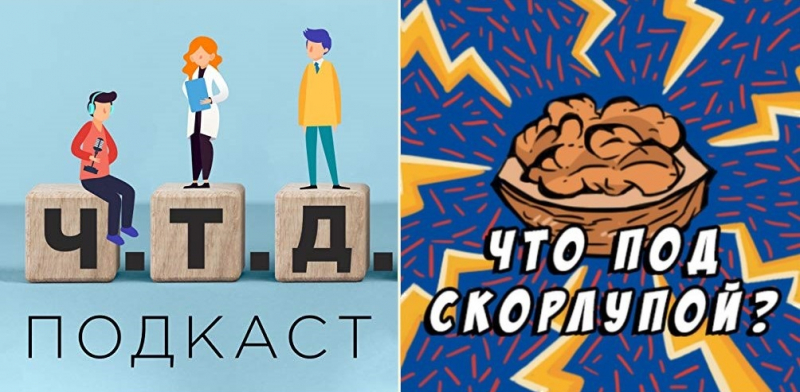
Covers of Ekaterina's podcasts Which was to be proved and What's under the shell? (right). Credit: audible.com and podchaser.com
Becoming the top graduate
Why did you decide to take part in the top graduate contest?
I was inspired by my colleagues at Megabyte – each year there is someone on the team who wins the contest. Everyone suggested we [this year’s graduates] apply, they believed in us, so I decided to try. I am usually very humble, so without the team I probably would have considered participating but eventually decided against it.
One requirement was to make a post on social media explaining what part of your time at ITMO you're grateful for. What did you write about?
I am grateful for the atmosphere and the people. ITMO is not just new coworking spaces, educational programs, or international exchange opportunities – it’s the people who create this great atmosphere. They help you grow, listen to your suggestions, and are always ready to offer assistance or support.
Will you still consider yourself a part of the ITMO.Family after graduation?
I will. I’ve met ITMO graduates at both of my jobs – so it seems like you can leave the university, but it’ll still stay with you.




